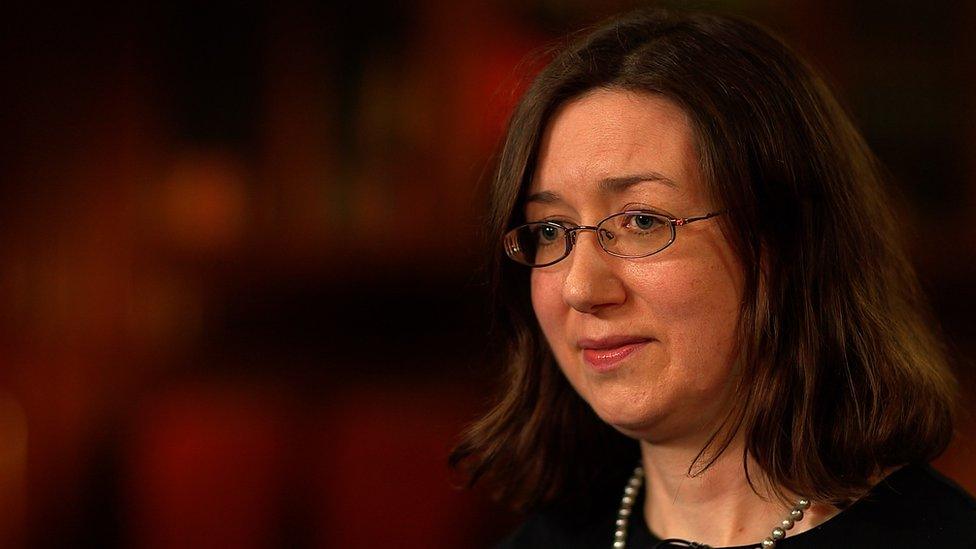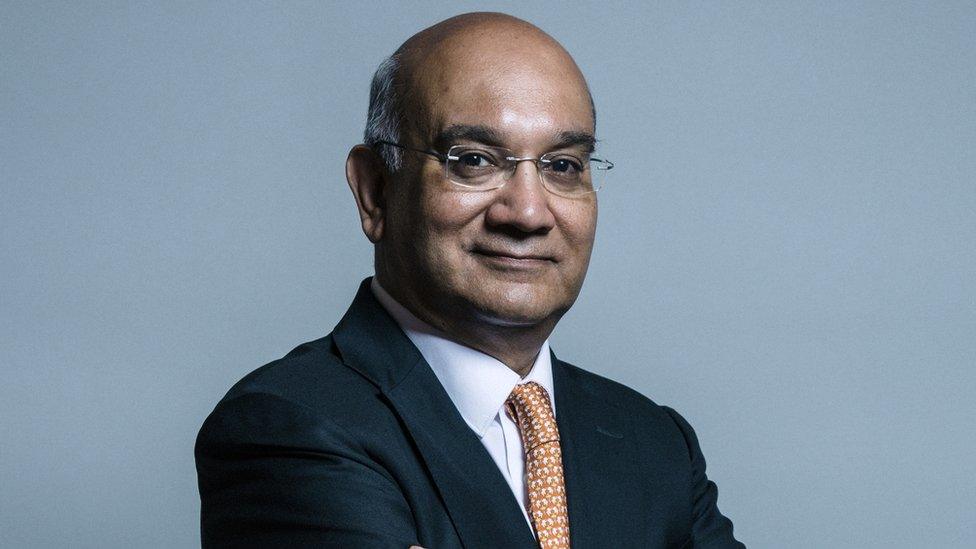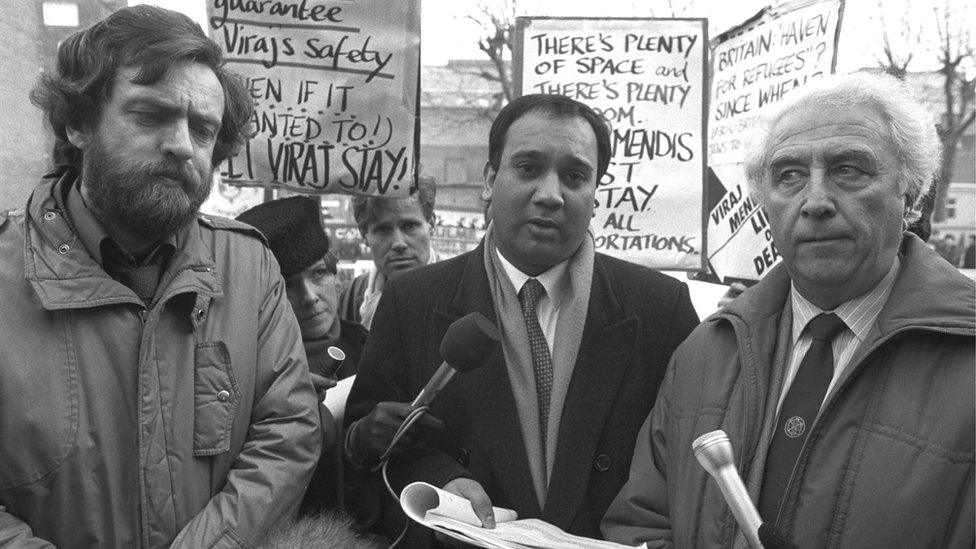Westminster bullying: Keith Vaz accused of bullying clerks
- Published

Former clerk Jenny McCullough alleges she was bullied by MP Keith Vaz
Since the first wave of Newsnight's investigation into bullying by MPs of clerks was published in March, we have been asked the same question repeatedly by clerks. "When are you going to look at Keith Vaz?" His conduct towards one clerk, in particular, was well known. The experience that Jenny McCullough went through is notorious.
Ms McCullough was highly regarded, and was promoted repeatedly. But, in the end, she had to leave, scarred by her treatment by Mr Vaz.
Ms McCullough told myself and Lucinda Day: "there are a lot of former staff who, like me, saw their future in the service of house and wanted to do an excellent job for it and I think they're exactly the sort of people that the House Service needs, but it has been prepared to sacrifice them for those members."
Ms McCullough was employed as a clerk - one of the non-political staff members that run the House of Commons and its committees - from 2002 to 2011. She served as second clerk of the Home Affairs Select Committee from 2007 to 2008. Mr Vaz was elected chair of the committee in 2007.
But the treatment she received meant she struggled to stay in the House. She told Newsnight the response of her managers was that: "it was as though there was something wrong with me, that I was too sensitive, that this was normal. And I found that a really hard response to deal with because they seem content to let Keith Vaz deliver this lesson to me by his treatment of me."
Mr Vaz has since resigned from that role; in 2016, a newspaper reported that he had hired prostitutes and showed willing to pay for drugs. He could not continue in his post as the chair of the committee on law and order. An inquiry into his behaviour is still going on. But Newsnight has learned about difficulties he posed for clerks throughout his tenure - problems that were not addressed by management.
Ms McCullough's saga has three key parts; first, she raised concerns about potential breaches of the House's rulebook and protocols with Mr Vaz. Second, she says, Mr Vaz bullied her in response to her raising concerns. And, third, the House of Commons failed to take action to protect her as she, in her view, stood up to a senior MP who was acting in a way that could undermine the reputation of the House.

Keith Vaz, MP for Leicester East
Rules and procedures
Ms McCullough's poor relationship with Mr Vaz owes much to a trip to Russia and Ukraine in 2008, when Ms McCullough was the clerk assigned to accompany the MPs. Part of the role of a clerk on these trips is to enforce a set of rules and standards which are intended to stop them from turning into publicly funded holidays or business trips.
The rules and standards - notably the so-called "Liaison Committee Rules" - demand, for example, that MPs arrange an itinerary before leaving that can be signed off. All MPs must stick together and complete the programme. They also demand that hospitality is either arranged by the committee as part of the programme or appropriately declared.
Newsnight has seen emails from Ms McCullough to her manager, which detail Ms McCullough's mounting concerns. An email sent late at night on 12 May 2008 explained what had happened that evening. It revolved around a dinner in Kiev which was being arranged by Mr Vaz.
She wrote: "The Chairman refused to tell me who we would be meeting or what the arrangements were beyond that we would be dining with Ivan, a friend of his who was (or used to be, I couldn't find out) a 'Senator'." But when she arrived, she discovered that it was what she called a "large" and "opulent" dinner, thrown in the MPs' honour.
She emailed her manager: "I have absolutely no idea who the other people there were - when I asked during the dinner the Chairman told me that HE didn't know - beyond one gentleman whose card said that he was the chairman of the board of an investment company. We didn't pay - I didn't know who did."
A representative for Mr Vaz has told Newsnight that the other people present at the dinner were members of the Ukrainian parliament for "an informal discussion on organised crime and immigration challenges. The Committee was not hosting the dinner: the hospitality did not need to be declared under the applicable rules and there was no rule broken."
They added: "The Clerks were fully aware of the contents of the programme and how it was financed, as they were responsible for costing the programme (and indeed whilst on the visit, the Clerks held all the daily funds for expenses and decided how they were spent)."
This is not supported by Ms McCollough's contemporaneous emails, nor her note that MPs on the trip were uncomfortable enough with the arrangement that they sought to make a contribution to the cost - an account Newsnight has corroborated with other people on the trip.
Furthermore, it clashes with an email sent by the senior clerk of the select committee to an MP a few months after the trip said that this dinner was one of two that was "arranged via the Chairman and neither the Committee staff nor the FCO were involved in the arrangements. The introductions were so short that no note could be taken of who was present".
Mr Vaz also brought a member of his own personal staff on the trip. Ms McCullough's email notes that she sought to remind Mr Vaz about the committee's rules, concerned that outsiders are not permitted to take part in committee events arranged for the benefit of MPs at public expense.
Mr Vaz's representative said: "No declaration was required for this arrangement, and no rules (Liaison Committee or otherwise) were broken in effecting it. To be clear, so far as our client is aware no objection was ever raised about the arrangement (had it been, the arrangement would have ceased)."
He stated that paid for her travel costs from his private income. The average cost of the trip to Russia and Ukraine for the MPs and clerks was £2,700 a head. An MP's salary in 2008 was £61,820.
Standing up to the chairman
The trigger for the deterioration in their relationship was when Ms McCullough sought to stand up to Mr Vaz about her concerns. She told Newsnight that, for example, Mr Vaz launched into a "tirade" against her in a hotel lobby.
She wrote to her manager: "He then demanded to know what age I was. He told me that I didn't know how the House worked and that I didn't respect the authority of Members - his authority in particular as a senior Member of many years experience and Chairman of the Committee - that I had an attitude problem…"
Ms McCullough told Newsnight: "at one point during this tirade, he told me that I wasn't capable of serving the committee because I wasn't a mother... All I knew was it wasn't normal to be harangued about my fertility status in the reception of a hotel room, at public expense in front of my colleague on the team. I think there were other members of the committee there, I think there may have been some foreign office staff and other guests of the hotel."
When the team returned from the trip, Ms McCullough's colleagues recall Mr Vaz's criticism of Ms McCullough being unrelenting and personal. Ms McCullough said he continued to criticise her for not being a mother.
Ms McCullough also says Mr Vaz also made jokes about whether Ms McCullough was a security threat, on account of her Northern Irish background and accent.
Ms McCullough told Newsnight that she was eventually asked to stop coming to team meetings, because his reaction to her presence was too disruptive, and prevented any work from being done by the team. She was eventually moved to another job elsewhere in the House. But, not feeling safe at work, elected to leave a few years later.
Mr Vaz denies any bullying. His representative said Mr Vaz "did not berate Ms McCullough at any stage whether before during or after the Russia trip, nor did he at any time insult her maternal status". They added: "Furthermore, our client finds the allegation that he would make insulting jokes about anyone on the basis of race extremely offensive" and "would never trivialise a person's ethnic background".

Jeremy Corbyn, Keith Vaz and Bob Litherland speak to the press after visiting Sri Lankan activist Viraj Mendis in London"s Pentonville prison, 1989
The House's response
These problems with Mr Vaz were well known to the House of Commons. Her annual appraisal for the year 2008 stated that "Jenny had excellent relations with Home Office officials and other witnesses, and with all the Committee apart from the Chairman, who chose to try to bully her. Jenny understandably and properly stood her ground, which the Chairman resented." No action was taken.
After she left the House, she complained about the way that she had been treated, raising concerns about the managerial response to the way that she was treated at work. She did not, however, think that complaining about Mr Vaz directly would be effective.
She told Newsnight: "I didn't feel able to complain about Keith Vaz because I was afraid of him...because he had a lot of influence. When I was on the Home Affairs committee I saw that he had friends in the police and friends in the law...he said that one of the principal clerks was a friend and by the time I was leaving the house he had a friend in the Speaker… I thought it could only end badly for me."
The House ruled that it had exercised its duty of care towards her, but the official tasked with reviewing her case noted that "I have no doubt that during her time as Second Clerk to the Home Affairs Committee, Jenny was treated by the Committee Chairman in a manner that was inappropriate."
The House of Commons told Newsnight: "We are aware that in the past the House has not had a robust process in place to deal with instances of bullying and harassment. We are confident that our new Independent Complaints and Grievance Policy will mean that allegations can be dealt with effectively and sensitively."
A representative for Mr Vaz told Newsnight that he denied any bullying, and said: "No complaint or allegation of this nature has ever been brought to his attention. Our client had considered that he and Ms McCullough had previously had a good working relationship, and had always considered her to be very effective as a Clerk."
Not an isolated case
But the problems with Mr Vaz went further than Ms McCullough. We have also heard repeated accounts from clerks of being bullied by Mr Vaz - and that it was the clerks who stood up to him who got the worst of his treatment.
Newsnight has heard about half-a-dozen trips where there were major deviations from the normal processes. We have heard of sudden cancellations of agreed programmes, unplanned excursions, mystery about who was paying for what and unexplained people in meetings.
It is not the case that this was a one-off.
There was a very significant departure from normal practise in 2008, during a trip to India and Bangladesh. Someone present on the trip said: "We'd chartered a private plane in Bangladesh for a committee trip. We were sat in the airport's departure lounge. There were around 10 unidentifiable Asian men in there."
"I realised I recognised them from the London restaurant where Keith Vaz would take staff for dinner. They came on the plane - the plane that had been privately chartered for us. They said he'd invited them. They followed us round on the trip."
The Foreign Office's notes on the trip, obtained via the Freedom of Information Act, noted that the committee members were lobbied by the men, who were curry restauranteurs, "before and during its visit." It is sometimes possible to allow third parties to join committee discussions, but the committee must make a decision to permit it - a decision that the clerk must be informed about.
Newsnight has learned, however, that the clerks, in this case, only found out these men were joining the trip when they sought to board the aircraft in the airport.
Mr Vaz's representatives said: "Our client cannot recall if any British Asian restauranteurs joined the Committee on the flight in question. Our client would not be surprised however it if it were the case, as the Committee inquiry's remit included considering the longstanding issue of facilitating entry into the United Kingdom for individuals in the catering industry."

Keith Vaz (second from right) with Bernie Grant, Paul Boateng, Neil Kinnock and Diane Abbott at the conference following his election in 1987
The House of Commons rulebooks
The House has a system for monitoring these rules, which revolves around the MP who chairs a body called the Liaison Committee. Mr Vaz's representative said that, in all cases, "The final programme was ultimately approved by the Chairman of the Liaison Committee". This MP has responsibility for approving trip expenditure.
The House of Commons, in its statement, noted that a "breach of the rules reported once a visit is over would be reported to the Chair of the Liaison Committee and to Committee Office management". Newsnight has documentary evidence that this episode was raised with the clerk of the Liaison Committee.
It is, however, not known whether anything was done. Alan Williams, who was then the chairman of the Liaison Committee, is now dead.
Newsnight has sought to obtain documents that would reveal what investigation was undertaken in these cases under the Freedom of Information Act. The request was refused on the grounds of "parliamentary privilege". The only person whose authority can be used to activate that clause in the law is John Bercow, speaker of the House of Commons.
Mr Vaz's representative said he "has never been reprimanded, censured or charged by the Liaison Committee for anything at any time".
For a story about a backbench MP, however, this story is unusually important.
First, her case highlights the institutional tolerance of bullying that has been a feature of the House.
Second, in the years since Ms McCullough left the Commons, Newsnight has learned that the clerks assigned to Mr Vaz's committee were no longer expected to stand up to him to enforce the rules and conventions.
It raises questions about whether the House of Commons Service has been defending the public interest as assiduously as one would expect by forcing MPs to live by the rules.
Third, this case may open up the prospect of real investigations into MPs' past behaviour that could lead to serious consequences. The House of Commons Commission, the board of the House of Commons, voted in March that it would investigate the culture that allowed bullying and harassment against clerks - but that it would not allow MPs to be investigated and sanctioned.
One of the seven MPs on that board were Valerie Vaz, Mr Vaz's sister. Another was Dame Rosie Winterton, a former Labour chief whip responsible for his behaviour. Mr Bercow has already recused himself from these discussions, because of allegations against him (which he denies).
If the issue returns to the Commission, these two may be required to recuse themselves as well, opening up the possibility that investigations might finally be permitted into MPs that could have real consequences for people found to have offended.